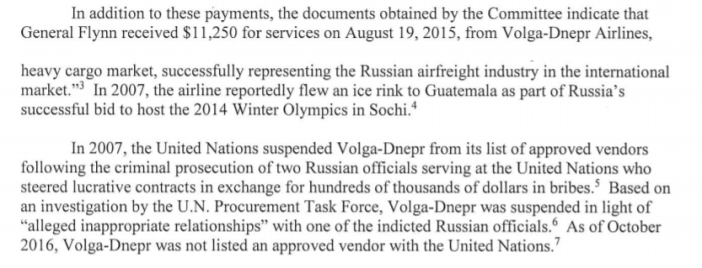Today US Congress Oversight Committee published a document outlining the sources and amounts of payments from Russian entities received by Gen. Michael Flynn in the period immediately preceding and in the course of the presidential campaign. Most media coverage focused on the amount paid by Kremlin’s so-called news TV channel, RussiaToday (RT), for Flynn to fly to Moscow in December 2015 and sit next to President Putin at the TV stations’ anniversary gala. And that’s understandable, given the unsavory optics of Flynn’s decision to, essentially, sell his body to Kremlin’s propaganda arm for 2 evenings and charge 55 k for it.
Lesser media attention was paid, however, to something potentially much more sinister. The Committee’s findings also disclose a payment of approx 11k from Volga Dnepr, a Russian aviation transportation company which has been a long-time market leader in delivering military equipment to hard-to-reach or highly dangerous locations; primarily thanks to its fleet of Antonov 124 large and sturdy planes. Volga Dnepr has for years been a logistics partner for the peace-keeping units of United Nations, and for the armies of European countries and the Pentagon. Or at least, it had been a partner until recently. We will come to that in a minute.
The Oversight Committee takes a jab at Volga Dnepr, implying poor judgement by Flynn in taking money from a company that was linked to a UN corruptoin scandal in 2007.
However, this incident predates Flynn’s possible engagement by nearly a decade and can only imply poor judgement and a broken moral compass. But for this we already have the RT trip.
What could potentially be more meaningful is that around the time of the services for which Flynn charged $11,250, Volga-Dnepr was in serious trouble with the Pentagon, and was in dire need of help, legal and otherwise. Shockingly, the House Oversight Committee seems completely unaware of this.
According to a Pentagon-issue document obtained by IntelligenceOnline.fr in November 2016, at some point in 2015, USTRANSCOM, Pentagon’s transportation procurement arm, suddenly annulled all of its contractual relationships with Volga-Dnepr. Volga-Dnepr initiated a FOIA suit in order to obtain information on the reason for such termination. To achieve that, it hired Squire Patton Boggs, the US law and lobbying firm that represents other Russian companies, such as Gazprombank, in their quest to get past the US sanctions. The Pentagon was in a pickle: under US FOIA law, it had to provide information in its reasoning and decision-making process in dismissing a procurement relationship; yet this was not an ordinary supplier, but a Russian arms speditioner that works closely with the Russian government. Any information about specific reasons for terminating the agreements would likely provide information to Moscow about what the US knew about Moscow. And it’s likely that that in itself was a key motive for the FOIA request.
Anyhow, after about a year of prevarication and procrastination, USTRANSCOM furnished Volga Dnepr with a heavily redacted motivation statement. The statement referred to multiple examples of Volga-Dnepr breaching US laws and nationa-interest doctrine, but the examples themselves were fully redacted (except one). The headings above each example, however, were telling: Subcontractor activities Counter to US Interests, Support to anti-US Regimes, Weapons proliferation, etc.
The only unredacted example listed in the statement was the delivery of 2 SU-30MK fighters to Vietnam in December 2014 on account of Rosoboronexport, a sanctioned Russian state arms-export company, transacting with with which makes any US counterpart ineligible for business.
